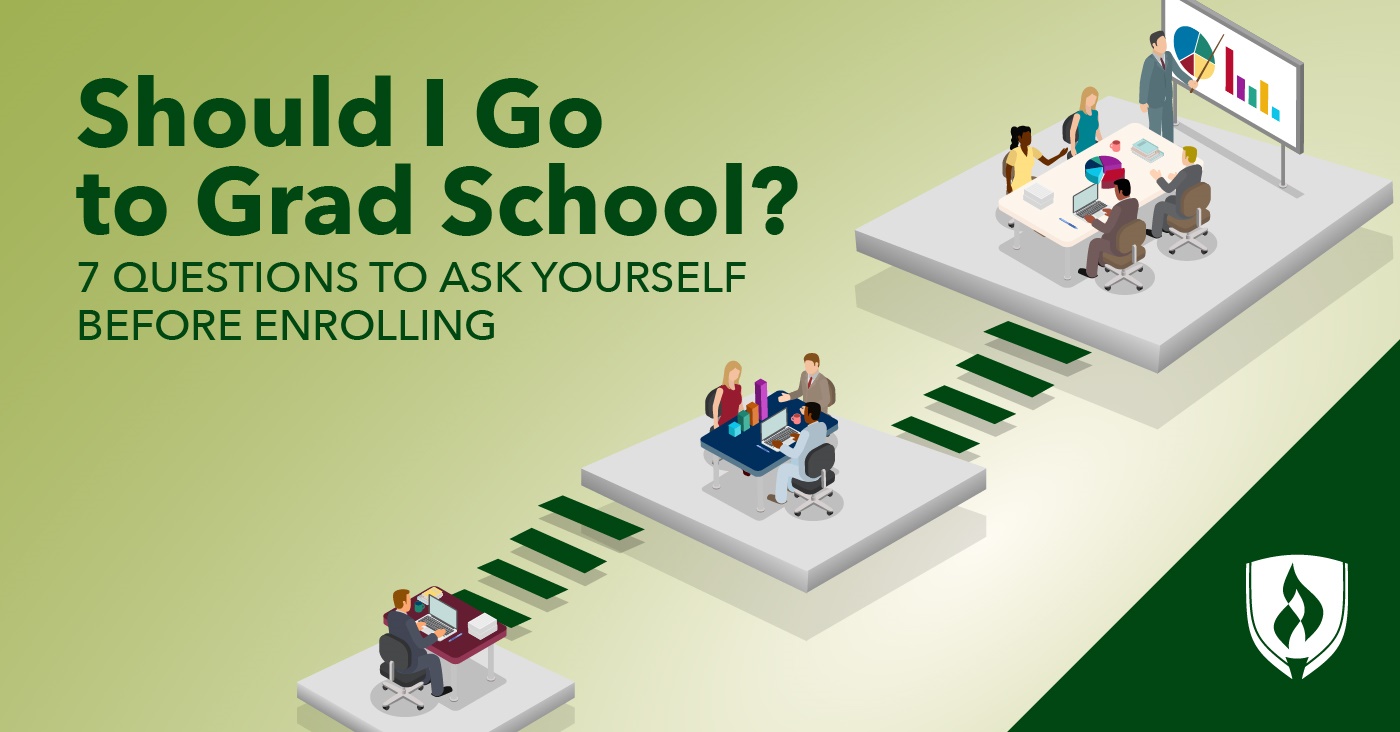Should I Go to Grad School? 7 Questions to Ask Yourself Before Enrolling
By Brianna Flavin on 02/11/2019

Graduate school can be such a tricky thing to analyze. You might hear someone talking about how advanced degrees are the new college education and are almost a requirement, right after you hear someone else bemoaning the never-ending cycle of education and asserting that work experience is all that really matters to employers.
If you are asking “Should I go to grad school?” you have probably wondered just how beneficial an advanced degree could be for your career and earning potential. After all, if a few years of extra education could mean a few decades in a better, more satisfying career, who wouldn’t go for it?
But deciding whether you should pursue grad school can get complicated. There are plenty of factors to consider, no matter which career you are aiming for. To help you get to the heart of this question, we asked experts with and without advanced degrees from different industries to share their wisdom on what you should consider before enrolling in grad school.
Should you go to graduate school? 7 Questions to consider
Attending graduate school is a big decision worth taking the time to think about. Before you take the plunge, spend some time considering the answers to the following questions:
1. Is the investment likely to pay off?
No doubt you’ve been thinking about this one already. There are so many reasons you might be excited about grad school, but finances can feel like a real barrier. “The first question I would ask myself related to graduate school is—is the degree worth the cost?” says Matthew Burr, HR consultant at Burr Consulting. “Is the return on investment worth the potential debt of the degree?”
“Individuals need to be honest with themselves and ask, ‘If I spend money to earn a graduate degree, will I be able to land a job with significantly more pay?’” says Matthew Ross, co-owner and COO of RIZKNOWS. “If the answer is no, then I’m not so sure the degree is worth it.”
The biggest downside to grad school is the debt it often comes with, says Roman Debotch, co-founder of BlackExcellence.com. “More students should exercise extreme caution when it comes to any and all student loans.”
Some professionals need advanced degrees to advance in their earning potential, but Ross realized that going to grad school wouldn’t likely change that much about his career. “I didn’t want to spend $100,000 on a degree that would eventually just lead me right back to where I was.”
Your specific situation might have more variables. For example, would a current or prospective employer assist with your tuition? Some companies have budgets to help their employees through more education. Are there scholarship or tuition remittance opportunities in programs you are looking at? Can you attend school part-time and continue working to avoid loans?
Do a little extra research into the finances, and you just might discover some affordable options. If an advanced degree qualifies you for positions with a higher salary, there’s a better chance that your investment in grad school is well-spent.
2. What skills or subject areas do I need to learn?
It’s common to think about advanced degrees as important pieces of paper for advancement—but think broadly about the knowledge and specific skills you need. Faud Hasanovic, marketing manager of Compass Insurance Agency, recommends checking out the course breakdown for any degree program you are considering and asking yourself whether that material will truly help you in your future career.
“When I made the decision to go to grad school, I took a hard look at myself. I analyzed my strengths and weaknesses, and figured out what I wanted my career to look like in the next five years,” Hasanovic says. If you look hard at what you really need to thrive, you might find yourself choosing a program or focus that will help you strengthen skills you are weaker in.
“After some self-reflection I realized that my marketing skills outweighed my leadership and management skills,” Hasanovic says. “This is when I made my decision to get an MBA focused on strategic management, rather than something in marketing.”
3. Will my schedule support grad school?
It’s important to consider the schedule changes grad school could bring to your life. “Timing is a very tricky thing,” Debotch says. “I would say attend grad school when you can fit it into your routine comfortably.” Whether that is when you have daytime availability or when you are at a time in your life where you can devote a good amount of time to your studies—it all depends on what you can handle.
“There’s a ton of flexibility now to earn a master’s through online programs that you can fit into your schedule,” says John Sammon, CEO of Sixth City Marketing. “But regardless of the program, there is a time and money commitment.” Sammon points out that grad school will almost always be a tough and busy period, so make sure you have the time and support you need going in.
4. Am I motivated enough to pursue this for several years?
“Ask yourself, am I determined enough to make it through schooling?” says Becca Kaye, marketing director of Murse World. “Not everyone is.” It’s easy to get inspired picturing yourself with an advanced degree, but concrete goals beyond crossing the graduation stage are a much better motivator long-term.
“If you’re going to grad school just to get a master’s degree, it probably isn’t the right choice,” Burr says. “You need to have an end goal in mind.”
Ask yourself what will keep you going when you are halfway through your program, in the thick of exams, labs or lectures and really tired of school. “You have to be honest with yourself and decide if you would be able to make it through the rigors of schooling.”
5. What doors will this degree open?
“Essentially, this question is trying to get down to your motives for wanting to go back to school,” Ross says. Ask yourself what will change when you have your next degree. Will you be qualified for a wider range of jobs? A different career path?
“Often individuals choose to go back to school so they can change industries,” Ross says, explaining that a salesperson wanting to go into construction management probably couldn’t make the switch without getting a different degree.
“I would wait until you reach your peak at your current job. Until you can’t advance any further without having a graduate degree on your resume,” Ross says, emphasizing that another degree isn’t always the magic ticket. There are some circumstances where job experience or networking can open doors as well.
6. Which school should I choose?
Many schools offer online graduate programs that help cater to the needs of working adults. Are you interested in that kind of platform? Would you prefer face-to-face? If you are considering an on-site program for grad school, it’s important to think about where you would relocate to attend, says Nate Masterson, CEO of Maple Holistics.
If you are choosing between several different programs, Masterson recommends digging into each school’s focal points. “Every school has different academic priorities,” Masterson says. “Depending on how their priorities align with yours, your choice could be simpler than you can imagine.”
7. Does the timing make sense for my life and my career?
“Grad school takes time and effort,” Hasanovic says. Ask yourself whether you are in a good season to embark on this journey. “It is important to take a look at your current responsibilities and truly assess if you can afford to carve out an extra 10 – 15 hours a week.”
Factors like your current career, family and financial circumstances—even the number of years that have passed since you were last in school—can all have a huge impact on your grad school readiness. If you look at these things carefully before enrolling, you can make a plan to keep your life in balance while pursuing more education.
Where do you stand?
All these smaller questions can help break down the much larger question—should I go to grad school? Evaluate the factors from this list and see where you stand. If graduate school still sounds like a good option, maybe it’s time to start researching one of the largest concerns in getting the most value out of your education—managing the cost.
For some ideas that can save you money while pursuing your education, check out our article, “How to Pay for a Master's Degree: 8 Smart Tips to Help Manage the Cost.”




